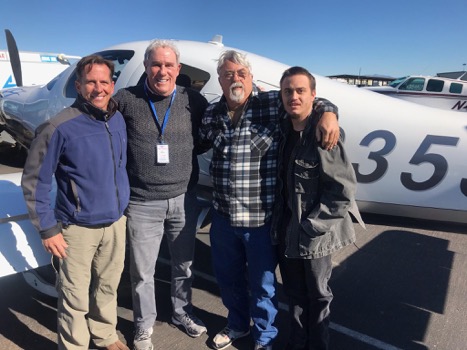“Juice” Newton on Angel Flight
In his seminal book, Democracy in America, the Frenchmen Alexis de Tocqueville, highlighted a key American trait which fascinated him – the volunteer instinct in support of the community.
Americans of all ages, all conditions, all minds constantly unite. Not only do they have commercial and industrial associations in which all take part, but they also have a thousand other kinds: religious, moral, grave, futile, very general and very particular, immense and very small; Americans use associations to give fêtes, to found seminaries, to build inns, to raise churches, to distribute books, to send missionaries to the antipodes; in this manner they create hospitals, prisons, schools.
Finally, if it is a question of bringing to light a truth or developing a sentiment with the support of a great example, they associate.
Everywhere that, at the head of a new undertaking, you see the government in France and a great lord in England, count on it that you will perceive an association in the United States.
In America I encountered sorts of associations of which, I confess, I had no idea, and I often admired the infinite art with which the inhabitants of the United States managed to fix a common goal to the efforts of many men and to get them to advance to it freely.
We recently had a chance to discuss one such association to which “Americans give freely” with a veteran USAF pilot who participates in an organization called Angel Flights.
Robert “Juice” Newton retired as a Col. From the USAF in 2007 and has been actively involved in the support for and development of combat innovations for airpower since his retirement.
He is a participant in a program called Angel Flight.
According to the organization’s web site, the focus of the organization is described as follows:
“Angel Flight West is a nonprofit, volunteer-driven organization that arranges free, non-emergency air travel for children and adults with serious medical conditions and other compelling needs.
“Our network of 1,400+ pilots throughout the 13 western states donate their aircraft, piloting skills, and all flying costs to help families in need, enabling them to receive vital treatment that might otherwise be inaccessible because of financial, medical, or geographic limitations.”
The site identified as well their level of activity and a recent map of flight activity.
“We fly over 10 missions every day of the year. This map shows some of our missions that you could fly. Each of these flights represents a chance for someone to get the medical care they need. Each flight is a chance for hope that you can help them achieve. We are grateful for your participation at whatever level works best for you.
“When you fly, how often you fly and whom you fly are all up to you. We don’t expect a certain number of flights. Our passengers understand that we don’t guarantee service. Cancelling for any reason is always your choice.”

According to Newton: “you meet an incredible variety of people.
“Recently we flew a young man, 23 years old who had a heart transplant this past summer.
“He was born with half a heart. But they wanted to wait till he became an adult before they did the heart transplant. He went through an interim stage, where they had a mechanical heart on this guy. His father flew with us and their positive attitude toward life was an amazing statement of how humans cope with adversity.”
“In that flight and others, I fly with “Buck” Marmis, a Vietnam fighter veteran. Many of us in the program are retired military pilots. And for us, this is another way to serve.”
He described how the service works.
“It is a virtual team. The patient contacts the organization which then asks for volunteers. When the mission is accepted the pilot deals directly with the patient. For example, young people who suffer from cancer might need a treatment at a specific facility several hundred miles from their home. We will fly them to the closest airport to that facility and they can get their treatment and be flown back home.”
Question: So why do you do it?
Newton: To make the patient’s life a little easier.
“In the case of our 23-year-old who had a heart transplant, he and his father would have had a very long drive between San Diego and Tucson so with Angel Flight we instead gave them a faster and much prettier view. At the destination their smiles are the best reward.”1
He also participates in another volunteer program for pilots to support wounded warriors, Veterans Airlift Command.
According to their website:
“The VAC provides free air transportation to post 9/11 combat wounded and their families for medical and other compassionate purposes through a national network of volunteer aircraft owners and pilots.”
I am sure if de Tocqueville traveled in America right now, in spite of all the political disarray, he would recognize the American spirit in what these pilots do.

